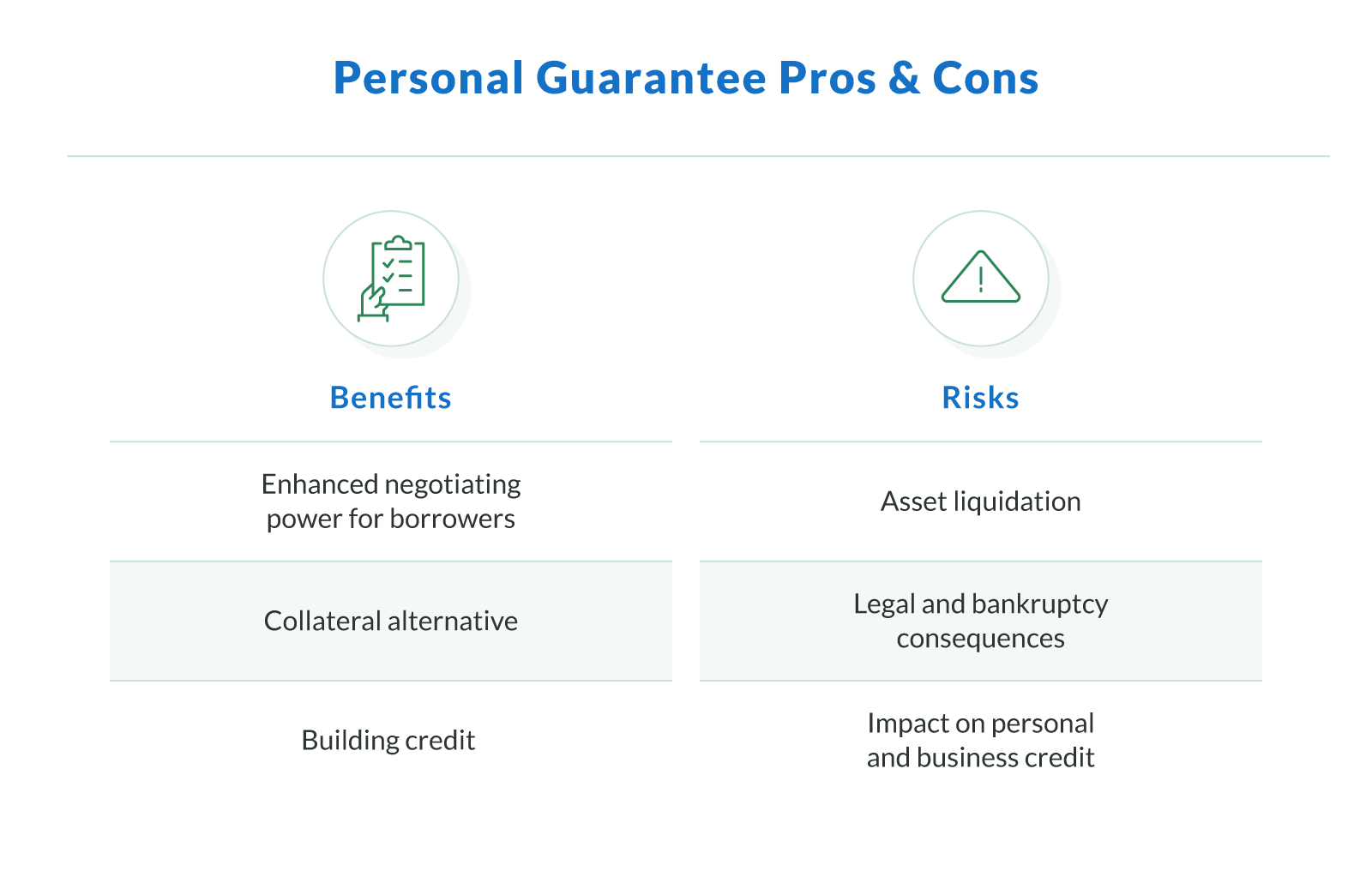A personal guarantee is a contractual obligation where a borrower, typically a business owner or key stakeholder, takes personal liability for repaying a loan amount if the business cannot meet its repayment terms. This agreement gives lenders an extra layer of security when approving small business loans so they can recover funds even if the company defaults. In most cases, lenders view a personal guarantee as a risk management tool when a company lacks the collateral or cash flow needed to qualify based solely on its business financials.
Unlike collateralized loans, which tie repayment to specific business assets, a personal guarantee extends liability to the guarantor's entire financial portfolio. This means lenders can pursue personal holdings such as savings, real estate, or vehicles to recover outstanding debts. In fact, lenders may also place liens on personal property or garnish wages if the borrower cannot fulfill the repayment terms. For many business owners, this added risk is a key factor in deciding how to structure their financing.
Lenders, particularly those offering SBA loans and traditional term loans, often require personal guarantees to minimize their risk. Most agreements mandate signatures from all stakeholders and business partners who own at least 20% of the business, reinforcing the financial commitment of those with a significant stake in the company's success.
How Personal Guarantees Work
A personal guarantee provides lenders extra assurance that a business loan will be repaid, even if the company struggles financially. Before approving funding, business lenders review a business owner's credit score, financial statements, and business credit history to assess risk. If the company has limited credit or inconsistent revenue, lenders may require a personal guarantee to move forward.
In fact, many lenders now use automated underwriting tools that flag risk indicators — such as low monthly revenue or high debt-to-income ratios — and automatically apply personal guarantee requirements to mitigate potential loss.
When a business defaults on a loan, the lender can go after the guarantor for the full amount owed. That means personal assets, like savings, real estate, or even money in a bank account, could be used to cover the debt. Unlike secured loans, which are backed by specific business assets, a personal guarantee makes the borrower personally responsible for repayment. This liability often extends to additional costs like late fees, attorney's fees, and court judgments, significantly increasing the financial burden if the loan remains unpaid.
Loan requirements vary, but most lenders require anyone with at least a 20% ownership stake to sign a personal guarantee. This ensures that those with the most control over the business also share in the financial responsibility. While a personal guarantee can make it easier to secure business financing, it also increases the risk for business owners if things don't go as planned. Some lenders may also include “acceleration clauses” in the loan agreement, which allow them to demand full repayment if the borrower violates any loan terms, even minor ones.
Types of Personal Guarantees
When signing a personal guarantee, business owners should understand the level of financial risk they are taking. The two most common types of personal guarantees are unlimited and limited, although variations like springing guarantees and bad boy carve-outs also exist in some loan agreements. The type of guarantee a lender requires depends on factors such as business structure, ownership distribution, and the overall risk profile of the loan.
Unlimited Personal Guarantee
An unlimited personal guarantee makes the personal guarantor responsible for the entire loan, including the principal balance, interest rates, legal fees, and penalties. It also means that if the business fails to repay, the guarantor's personal credit report can reflect the default, impacting their ability to borrow for mortgages, car loans, or personal credit cards.
However, it also exposes the guarantor to significant financial risk. If the business defaults, lenders can pursue personal assets such as real estate, savings, and even future earnings to recover the full amount owed.
Some loan agreements include language that allows for wage garnishment or asset liens without requiring prior court approval, especially in states with lender-friendly laws. For married borrowers, some lenders may also require spousal signatures on the guarantee, particularly when jointly held assets are involved. This type of guarantee is common for sole proprietors or majority stakeholders since it provides lenders with maximum security.
Limited Personal Guarantees
A limited personal guarantee caps the loan amount a borrower is responsible for, reducing the extent of personal liability. This type of guarantee often correlates with business ownership percentage. For example, a partner with a 25% stake in the company may only be responsible for 25% of the outstanding debt.
While this structure offers some financial protection, lenders may still enforce joint and several liability clauses. This means that even if each partner's liability is limited on paper, one partner may be forced to cover the full loan amount if others default and cannot pay their share. Business owners can sometimes negotiate the terms of a limited guarantee, including setting a fixed dollar amount or requesting that their liability “burn off” over time as the loan is repaid.
Joint vs. Several Guarantees
In cases where multiple guarantors back a loan, lenders frequently include joint and several liability clauses as a condition of the loan. This clause means any individual guarantor can be held responsible for the entire loan if the other guarantors cannot pay. While this structure ensures lenders can recover their funds, it can create financial strain if one partner is unable to meet their obligation.
For instance, if three co-owners each guarantee 33% of a loan and one becomes insolvent, the remaining two may be forced to cover the full balance. This structure is common in partnerships and multi-owner LLCs, where lenders want to avoid finger-pointing or delays in repayment collection. It's essential for guarantors in these situations to have a clear internal agreement, separate from the loan, that outlines shared financial responsibilities.
Why Choose a Personal Guarantee?
A personal guarantee can be a useful tool for business owners who need financing but may not qualify based on business credit alone. Lenders see it as added security, making it easier for startups, seasonal businesses, and companies with fluctuating revenue to access funding.
For many borrowers, signing a personal guarantee is the key to securing capital for growth, covering cash flow gaps, or keeping operations running. It also allows small business owners to access funding quickly, often within 24 to 48 hours, when using online lenders or non-bank alternatives.
Here are some of the key benefits of a personal guarantee:
Enhanced negotiating power. A strong personal credit history can help borrowers secure lower fees, longer repayment terms, and more flexible payment structures. Lenders may be more willing to offer favorable terms when they know the guarantor is personally backing the loan. Some lenders may waive origination fees or offer interest rate reductions if the borrower's personal credit score is above 700.
Collateral alternative. Businesses without significant hard assets, such as real estate, equipment, or inventory, can use a personal guarantee instead of pledging business property. This is especially important for service-based companies or e-commerce businesses that operate lean and have limited physical inventory. This type of loan allows business owners to access financing without putting key business assets at risk.
Building credit. Making timely loan payments can improve both business and personal credit scores. A stronger credit profile can open the door to better financing opportunities in the future, including larger loan amounts and lower interest rates. It can help a business qualify for unsecured lines of credit, eliminating the need for guarantees.
Risks of a Personal Guarantee

A personal guarantee can help secure business financing, but it also comes with serious financial risks. If a business defaults on a loan, the guarantor is personally responsible for repaying the debt. This arrangement can put personal assets, such as real estate, savings accounts, or retirement funds, at risk. Failure to meet repayment obligations can also damage both personal and business credit, making it harder to qualify for future financing.
Business owners should understand these risks and take steps to reduce their exposure before signing a personal guarantee. You should always request a copy of the full loan agreement in advance and have your attorney review it, especially if there are acceleration clauses, cross-default provisions, or other legal traps that could increase your liability.
Asset Liquidation
If a business defaults, lenders have the legal right to seize personal assets to recover the amount of the loan. This scenario could lead to home foreclosures, vehicle repossessions, or drained savings and retirement accounts. Many business owners assume their liability is limited to their business, but a personal guarantee extends responsibility to their individual finances.
To protect personal assets, business owners should explore limited personal guarantees, which cap the amount they are responsible for. Also, maintain a separate business bank account and avoid using personal credit cards for business expenses, which helps to reinforce the corporate veil and reduce the chance of personal asset exposure in court.
Another option is using business assets like equipment or inventory as collateral instead of signing a personal guarantee. Forming an LLC or corporation can also help shield personal assets, though courts may override these protections if business and personal finances are not kept separate.
Legal and Bankruptcy Consequences
If a guarantor is unable to repay the debt, lenders may take legal action, including lawsuits and deficiency judgments. This can result in additional court fees and legal expenses to the outstanding balance. In extreme cases, filing for personal bankruptcy may be the only option, but this can damage credit for seven to ten years and may disqualify business owners from serving as corporate officers in the future.
Before signing a personal guarantee, business owners should have an attorney review the loan agreement. Clauses such as cross-collateralization, when personal assets back multiple loans, or acceleration clauses, which demand full repayment after minor defaults, can increase financial exposure.
Negotiating these terms up front can reduce risk. Business owners should also consider specialized insurance, such as directors and officers (D&O) liability insurance, which can help cover legal fees in case of a dispute.
Impact on Personal and Business Credit
Because many business loans with personal guarantees appear on both business and personal credit reports, a default can cause long-term financial harm. Business credit bureaus, such as Dun & Bradstreet, track business payment histories, while consumer bureaus like Experian, Equifax, and TransUnion monitor personal obligations. A single missed payment can hurt both the business's ability to secure trade credit and the owner's ability to qualify for personal loans.
Business owners should prioritize building strong business credit before applying for loans. Establishing tradelines with suppliers, paying vendors on time, and using business credit cards responsibly can improve business creditworthiness.
Over time, this makes it easier to qualify for financing without needing a personal guarantee.
Alternatives to Personal Guarantees
For small business owners who want to secure financing without taking on personal liability, several options exist. While a personal guarantee can improve loan approval odds, it also puts personal assets at risk. Fortunately, there are financing options that reduce or eliminate this eligibility requirement, including secured loans, SBA-backed programs, and revenue-based financing.
However, keep in mind that most unsecured loans still require personal guarantees unless your business has a long-standing track record and high monthly revenue. Lenders want to see strong cash flow, business credit history, and healthy bank balances to waive a guarantee requirement.
Collateral-Based Financing
Businesses with substantial physical assets, such as machinery, commercial real estate, or inventory, can use secured loans instead of signing a personal guarantee. In this type of financing, the lender places a lien on the business asset, which serves as collateral for the loan.
While this approach protects personal assets, it does carry risks. If the business defaults, the lender can seize and sell the collateral to recover the outstanding balance. Secured loans are ideal for businesses that own valuable assets and want to protect their personal assets from risk.
That said, not all lenders offer asset-backed loans. For example, Clarify Capital offers revenue-based loans that do not require collateral, making them a viable option for businesses with at least $10,000 in monthly revenue.
SBA Loan Programs
The Small Business Administration offers financing options with reduced personal guarantee requirements. SBA 7(a) loans, for example, require guarantees from all individuals with at least a 20% ownership stake but may allow lower guarantee thresholds for larger loan amounts.
While these loans still involve some level of personal liability, they often come with lower interest rates and longer repayment terms than traditional loans. Small business owners looking for government-backed funding with more favorable terms may find SBA loans to be a good alternative.
But note that SBA loans are not available to startups — your business must typically be at least two years old and show positive revenue trends. You'll also need a business bank account and three months of statements to apply.
Revenue-Based Financing
For businesses with strong sales but limited credit history, revenue-based financing provides another option. Instead of requiring collateral or a personal guarantee, lenders assess a company's accounts receivables or projected future revenue. Merchant cash advances (MCAs), for example, allow businesses to borrow against future credit card sales, with repayment automatically deducted from daily transactions.
While this type of financing can be easier to qualify for, it might come with higher effective interest rates. Business owners should weigh the costs and repayment structure carefully before choosing this option.
Clarify Capital offers unsecured loan options like MCAs and lines of credit that don't require personal or business collateral, making them accessible even if you have a lower credit score (minimum 550).
Weighing Risk vs. Access: Should You Sign a Personal Guarantee?
Personal guarantees provide access to business financing, but they also come with significant financial risks. For entrepreneurs and small business owners, these agreements can be the key to securing a loan agreement that fuels business growth. Still, they also expose personal finances to potential losses if the business defaults.
The decision to sign a personal guarantee should be based on a clear understanding of risk tolerance, available assets, and long-term business goals. If you're applying for your first business loan or don't have strong business credit, a personal guarantee may be your only option, but that doesn't mean you can't negotiate the terms.
Negotiating favorable terms, building strong business credit, and seeking professional guidance can help you minimize your exposure while leveraging business financing to drive sustainable growth.
Need funding without putting your personal assets on the line? Clarify Capital offers flexible loan options tailored to small business owners. Apply today to explore financing solutions designed for your needs.
FAQ About Personal Guarantees
Personal guarantees are a common yet often misunderstood aspect of business financing. They can open the door to more flexible loan options, but they also come with real financial risks. If you're considering a loan that requires a personal guarantee, it's important to understand how this commitment affects your credit, when lenders typically require it, and what happens if your business can't repay the loan. This section answers the most pressing questions so you can make informed, confident decisions.
How Do Personal Guarantees Affect Credit Scores?
A personal guarantee can directly impact a borrower's personal credit score, especially if the business struggles to make payments. While business credit is typically separate from personal credit, missed payments or defaults on a personally guaranteed loan can appear on the guarantor's credit report. Many online lenders and traditional banks report delinquent accounts to consumer credit bureaus, which can lower the borrower's score and make it harder to qualify for future financing options.
Making on-time payments can help build a stronger credit profile, improving both business and personal credit over time.
When Do Lenders Require a Personal Guarantee?
Business lenders typically require a personal guarantee when financing startups or businesses with limited business credit history. Since many new companies lack strong financials or valuable assets to secure a loan, lenders may require a personal guarantee to minimize risk. This arrangement is especially common for SBA loans, term loans, and lines of credit. Even established businesses may need to provide a personal guarantee when applying for a large loan or seeking financing with more flexible terms.
What Happens if You Default on a Loan With a Personal Guarantee?
If a borrower or business owner defaults on a business loan backed by a personal guarantee, lenders have the legal right to pursue repayment from the guarantor. Such action can involve seizing personal assets, such as real estate, bank accounts, or other valuable property, to recover the outstanding balance.
A default can also severely damage your credit history, making it difficult to secure future financing. Some lenders may take legal action, leading to lawsuits or judgments against the guarantor.
Also note that some lenders may attempt to collect even after the business has shut down if the guarantee is still enforceable. Understanding these risks and making sure you can repay the loan before signing a personal guarantee is crucial to protecting personal financial security.

Michael Baynes
Co-founder, Clarify
Michael has over 15 years of experience in the business finance industry working directly with entrepreneurs. He co-founded Clarify Capital with the mission to cut through the noise in the finance industry by providing fast funding and clear answers. He holds dual degrees in Accounting and Finance from the Kelley School of Business at Indiana University. More about the Clarify team →
Related Posts





